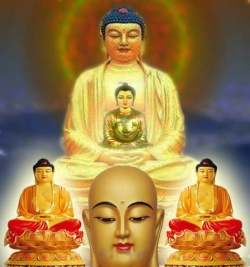Difference between revisions of "Warrior"
| Line 1: | Line 1: | ||
| − | [[File:1bnmhj3 | + | [[File:1bnmhj3 n.jpg|thumb|250px|]] |
<poem> | <poem> | ||
[[warrior]]: ([[Tibetan]]: "[[pawo]]"): The [[essence]] of [[warriorship]], or the [[essence]] of [[human]] bravery, is refusing to give up on anyone or anything. We can never say that we are simply falling to pieces or that anyone else is, and we can never say that about the [[world]] either. Within our [[lifetime]] there will be great problems in the [[world]], but let us make sure that in our [[lifetime]] no {{Wiki|disasters}} happen. We can prevent them. It is up to us. We can save the [[world]] from destruction, to begin with. That is why [[Shambhala vision]] [[exists]]. It is a centuries-old [[idea]]: by serving this [[world]] we can save it. But saving the [[world]] is not enough. We have to work to build an [[enlightened]] [[human]] {{Wiki|society}} as well. | [[warrior]]: ([[Tibetan]]: "[[pawo]]"): The [[essence]] of [[warriorship]], or the [[essence]] of [[human]] bravery, is refusing to give up on anyone or anything. We can never say that we are simply falling to pieces or that anyone else is, and we can never say that about the [[world]] either. Within our [[lifetime]] there will be great problems in the [[world]], but let us make sure that in our [[lifetime]] no {{Wiki|disasters}} happen. We can prevent them. It is up to us. We can save the [[world]] from destruction, to begin with. That is why [[Shambhala vision]] [[exists]]. It is a centuries-old [[idea]]: by serving this [[world]] we can save it. But saving the [[world]] is not enough. We have to work to build an [[enlightened]] [[human]] {{Wiki|society}} as well. | ||
Latest revision as of 03:20, 17 August 2014
warrior: (Tibetan: "pawo"): The essence of warriorship, or the essence of human bravery, is refusing to give up on anyone or anything. We can never say that we are simply falling to pieces or that anyone else is, and we can never say that about the world either. Within our lifetime there will be great problems in the world, but let us make sure that in our lifetime no disasters happen. We can prevent them. It is up to us. We can save the world from destruction, to begin with. That is why Shambhala vision exists. It is a centuries-old idea: by serving this world we can save it. But saving the world is not enough. We have to work to build an enlightened human society as well.
"The warrior is sensitive to every aspect of phenomena-sight, smell, sound, feelings. He appreciates everything that goes on in his world as an artist does. His experience is full and vivid. ... Because of his sensitivity, the warrior can then go further in developing his discipline. he begins to learn the meaning of renunciation." (pg 65-66)
"One who is brave", not being afraid of who you are."
"The warrior, fundamentally, is someone who is not afraid of space"... "for the warrior unconditionality does not have to be conditioned or limited. It does not have to be qualified as either positive or negative, but it can just be neutral - as it is." "...the fruition of warriorship: the complete primordial realization of basic goodness or, therefore, about yourself. When you expose your naked flesh to the universe can you say, 'Should I put a second skin on? Am I too naked?' You can't. at that point, there is no room for second thoughts. You have nothing to lose and nothing to gain. You simply expose your heart completely."
"...the warrior's journey is based on resting in the state of warriorship, rather than struggling to take the next step. the warrior experiences a sense of relaxing in his achievement, which is not based on ego-centered concerns but on resting in unconditional confidence, free from aggression. So the journey becomes like a flower unfolding-it is a natural process of expansion."
see also: Pawos
